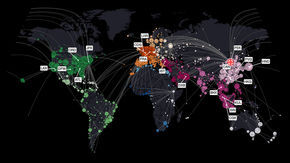
'Corona Crisis: Once Upon a Pandemic' is a podcast that explores the watershed event in world history from an array of perspectives. Together with expert guests that are engaged with managing and making sense of the global coronavirus outbreak, podcast hosts Eric Paglia and Marc van den Bossche discuss different dimensions of the pandemic, with a focus on crisis management at the national and international levels, and the long term societal and geopolitical implications of the COVID-19 contagion.
Episodes

Wednesday May 05, 2021
Wednesday May 05, 2021
Well over a year into the pandemic, the second-wave Covid outbreak currently devastating India has become perhaps the most tragic, almost apocalyptic, chapter of the coronavirus crisis so far. India expert Prof. Ashok Swain, head of the Department of Peace and Conflict Research at Uppsala University, joins the podcast to explain how the second wave came to overwhelm India, including urban middle-class areas that were not as affected by the initial outbreak.

Thursday Apr 08, 2021
Theories of the pandemic: Six styles of Covid conspiracies
Thursday Apr 08, 2021
Thursday Apr 08, 2021
It would be an understatement to say that the coronavirus crisis is fertile ground for the cultivation of conspiracy theories. For an increasing number of people around the world, the pandemic is the mother of all conspiracies, with the various theories of the conspiracy coming in literally all shapes and sizes. Prof. Andreas Önnerfors, an expert on conspiracy theories at Uppsala University, joins the podcast to explain the six types of theories that have taken root over the course of the pandemic, and how these are fueling social unrest and creating unlikely constellations of activists taking to the streets together. Plus, podcast co-host Marc shares the experience of his current Covid infection.

Tuesday Feb 09, 2021
Tuesday Feb 09, 2021
After almost one year as a full spectrum crisis in many if not most countries, Covid-19 continues to challenge governments around the world and inflict enormous strain on societies and their institutions. The protracted nature of the coronavirus pandemic renders it radically different from the kinds of crises that political leaders and public authorities are accustomed to dealing with. Prof. Paul ‘t Hart of Utrecht University joins the podcast to assess the governance so far of the most complex and enduring crisis in generations, and survey the long shadow the pandemic will inevitably cast years into the future.

Tuesday Dec 22, 2020
Adaptation during crisis: Learning how to manage the coronavirus pandemic
Tuesday Dec 22, 2020
Tuesday Dec 22, 2020
As the pandemic’s second wave washes over much of the world, it is worth considering if and how authorities, organizations and personnel engaged with combating the coronavirus manage to learn over the course of such crises, and adapt their operations accordingly. Prof. Daniel Nohrstedt of Uppsala University joins the podcast to explain the concept of adaptation as it relates to crisis management, particularly in the context of COVID-19 and Sweden, and how a major crisis like the 2020 pandemic can provide a window of opportunity for far-reaching transformation.

Wednesday Oct 28, 2020
Wednesday Oct 28, 2020
Touted as a tool to forewarn policymakers of outbreaks at the local level, tracking COVID-19 through wastewater can complement traditional testing and provide unique and potentially actionable insights into the spread of the virus across the entire population of a given area. This episode of the podcast features an interview with Dr. David Nilsson, director of the Water Center at KTH Royal Institute of Technology which has been leading a project on tracing the coronavirus in the municipal wastewater system of Stockholm. Dr. Nilsson also reflects on the relationship between science and decision-making during times of crisis, when results of scientific studies are not yet fully certain but the need to take action is great.

Sunday Jul 05, 2020
Sunday Jul 05, 2020
Sweden’s highly decentralized system of government, efficient under normal circumstances, is an important factor that influenced the idiosyncratic Swedish strategy for managing the coronavirus crisis. Given the relatively constrained central political authority, with expert agencies and local administrations wielding a great deal of power in the Swedish system, could Sweden have possibly managed the crisis any differently, perhaps more effectively, or was the liberal approach the only option? Diverging from the strict coercive measures of most other European countries, Sweden’s far less stringent response amounted to a series of “nudges” to encourage Swedes to take the necessary precautions to contain the spread of COVID-19, according to Prof. Jon Pierre of Gothenburg University who joins the podcast to share the results of his analysis of Sweden’s strategy in comparison with other countries.

Tuesday Jun 16, 2020
Tuesday Jun 16, 2020
The global coronavirus pandemic instigated a range of national strategies for managing the crisis, no two more divergent than those of Italy and Sweden. The former chose to fight the virus through a strict lockdown, while the latter took a much more permissive path largely based on personal responsibility. As Italy reopens after months of individual and societal isolation, Prof. Giuliano di Baldassare, director of the Center for Natural Hazards and Disaster Sciences at Uppsala University, discusses how despite the radically different responses, the outcomes in Italy and Sweden seem at this point remarkably similar.

Monday Jun 08, 2020
To fear or not to fear: Conceptions of COVID-19 in Italy and Sweden
Monday Jun 08, 2020
Monday Jun 08, 2020
Is COVID-19 a super-contagious killer akin to Ebola in deadliness, or something more similar to a severe seasonal flu? In the course of the current pandemic, the populations of Italy and Sweden, informed by the media and public officials, have come to conceive of COVID-19 in strikingly different ways. This has influenced behavior and the ability of government authorities to manage the crisis in the two countries. In the first of a two-part interview, Prof. Giuliano di Baldassare—an Italian living in Sweden—explains how divergent conceptions of the coronavirus alternately facilitates and complicates crisis management depending on where on the curve a country is.

Wednesday Jun 03, 2020
Pandemic geopolitics: China and the coronavirus crisis
Wednesday Jun 03, 2020
Wednesday Jun 03, 2020
Despite being the coronavirus country of origin, China seized the opportunity presented by the pandemic to promote its geopolitical agenda across much of the world. To analyze the ways in which China has exploited the COVID-19 crisis, and discuss how receptive or resistant different countries and regions are to China’s advance and attempts to reorder the world in the wake of the pandemic, this episode of the podcast features Dr. Björn Jerdén, head of the Asia program at the Swedish Institute of International Affairs.

Monday May 25, 2020
Expertise and Power: Historical roots of Sweden’s coronavirus response
Monday May 25, 2020
Monday May 25, 2020
Sweden has attracted enormous international attention for its far less stringent coronavirus strategy, largely devised by scientists inside the state bureaucracy. What Swedish governance traditions and political philosophies led to the expert-driven response to COVID-19 that has been variously commended and condemned by commentators both inside and outside of Sweden, and politicized by activists on the left and the right? Prof. Sverker Sörlin, a leading historian and public intellectual, joins the podcast to discuss the historical roots of Sweden’s coronavirus response, and explain how it is being misunderstood and misrepresented by many observers in the midst of the global pandemic.
